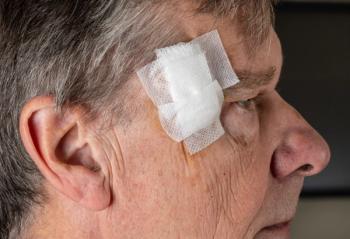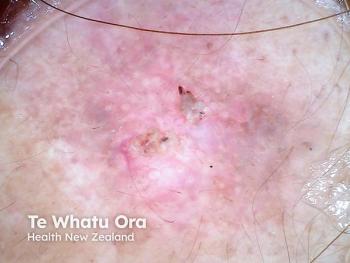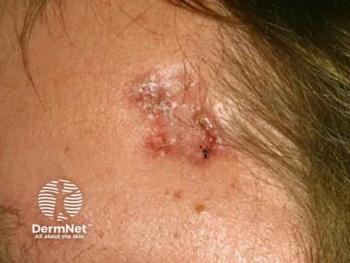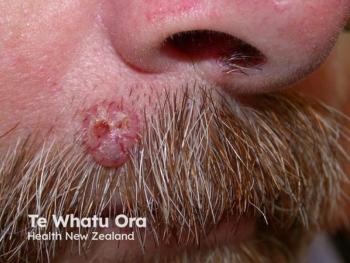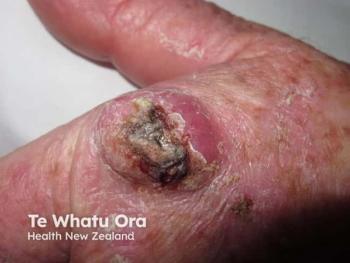
- Dermatology Times, November 2022 (Vol. 43. No. 11)
- Volume 43
- Issue 11
How Mohs Surgeons Use Prognostic Testing for High-Risk SCC
The 40-gene expression profile (40-GEP) test can focus treatment options and optimize patient outcomes, according to a poster presentation at the 2022 Fall Clinical Dermatology Conference.
The 40-gene expression profile (40-GEP) test can focus treatment options and optimize patient outcomes for high-risk cutaneous squamous cell carcinoma (SCC), according to a poster presentation at the 2022 Fall Clinical Dermatology Conference in Las Vegas, Nevada.1 Investigators of the study sought to determine how patient management decisions are impacted by Mohs surgeons' use of the 40-GEP test, and how the test can improve patient outcomes.
Current members of the American College of Mohs Surgery (ACMS) participated in an anonymous survey. The study consisted of demographic questions, familiarity with and use of National Comprehensive Cancer Network (NCCN) guidelines, American Joint Committee on Cancer-8 staging, Brigham and Women's Hospital Tumor staging, and the 40-GEP.
Participants (n=39) were given background on the validation of the 40-GEP test, then evaluated the use of risk factors for the assessment of SCC patients within their practice and which were concerning enough to require the 40-GEP test. Participants were presented with a high-risk SCC patient vignette and asked for their risk assessment and treatment approaches pre- and post-40-GEP results.
Researchers determined that study participants' use of the 40-GEP test aligned with the NCCN’s very high and high-risk factors. When the Mohs surgeons were presented with a clinicopathologic risk factor of a depth <6mm or invasion beyond subcutaneous fat (NCCN ranking 5), 79% of study participants chose to utilize 40-GEP. Additionally, when presented with a clinicopathologic risk factor of tumor cells within the nerve sheath of a nerve lying deeper than the dermis (NCCN ranking 5), 72% of study participants chose to utilize 40-GEP.
Study results demonstrated that “42% of Mohs surgeons reported increased confidence in management decision with 40-GEP testing.”
To conclude the study:
- 97% of Mohs surgeons in the study are familiar with or use the 40-GEP test for high-risk SCC patients
- Clinicopathologic risk factors most likely to cause metastasis would also prompt usage of the personalized molecular information provided by the 40-GEP test
- 40-GEP results guide Mohs surgeons to make risk-aligned management plans and increase their confidence in these decisions
- 40-GEP can focus treatment options in the most risk-appropriate manner, allowing for an optimization of healthcare resources and improved patient outcomes.
Reference
- Arron S, Fitzgerald A, Siegel J, Prasai A, Rackley B, Kurley S, Moody, B. How Mohs surgeons utilize prognostic testing for high-risk cutaneous squamous cell carcinoma (SCC): a clinical impact study. 2022 Fall Clinical Dermatology Conference. October 21, 2022. Las Vegas, Nevada.
Articles in this issue
about 3 years ago
New Tech for Skinabout 3 years ago
Update on New Laser Treatments for Acneabout 3 years ago
Are You Prepared for Potential Tax Law Changes?about 3 years ago
Genetic Profiling and the Future of Therapeutics in Dermatologyabout 3 years ago
Low-Dose Oral Minoxidil for Hair Growthabout 3 years ago
The Role of Precision Medicine in the Management of Melanomaabout 3 years ago
The Latest Buzz in Atopic Dermatitisabout 3 years ago
Hand Healthabout 3 years ago
Hidradenitis Suppurativa: Current and Future TreatmentsNewsletter
Like what you’re reading? Subscribe to Dermatology Times for weekly updates on therapies, innovations, and real-world practice tips.

